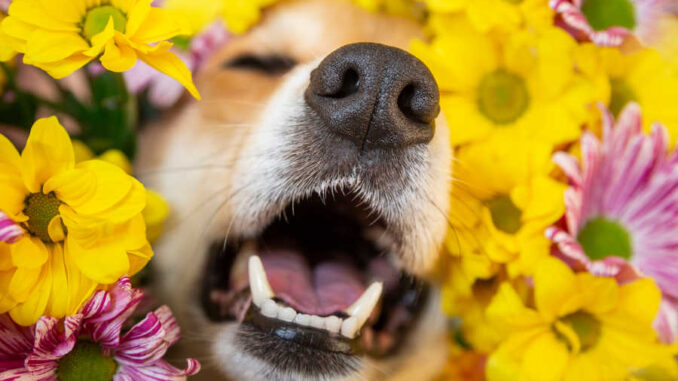
This article was updated on July 18th, 2023
A dog sneezing may be perfectly normal and not a cause for concern. Like humans, dogs often sneeze when their nasal passages are irritated. However, sneezing a lot, especially when there are other signs present, such as nasal discharge, cough, or feeling unwell, is a common reason that I see patients in my veterinary hospital. There could be something more serious going on – such as allergies. In this article, we will discuss sneezing due to allergies, how you can help your dog, and when sneezing is a reason to call your vet.
Allergies that can cause sneezing in dogs

Dogs, like humans, can be allergic to a myriad of things in the environment, including grasses, trees, molds, and much more. An environmental allergy is the only type of allergy that will cause sneezing in dogs. Food allergies do not cause dogs to sneeze, but manifest as other signs instead.
Typically, environmental allergies follow a seasonal pattern and therefore come and go with the changing of the seasons. Where I practice as a veterinarian, there are a lot of cotton fields, and each year when ginning begins, I see many dogs affected by allergies in my office.
Though sneezing can definitely be one sign of environmental allergies, these dogs may also cough, wheeze, have runny eyes and noses, scratch themselves, and lick their paws. All of these are a sign to have your dog evaluated by your veterinarian: treatment typically consists of allergy medications and treating any underlying skin infections. Hyposensitization injections are also an option for some dogs.
Dog sneezing due to allergies: when is it a problem?

An environmental allergy is a relatively benign condition that is rarely fatal. However, sneezing repeatedly due to allergies can be miserable for your dog and drastically reduce their quality of life. Further, environmental allergies are the leading cause of both skin infections and ear infections in dogs. These secondary conditions must be treated, and the allergies must be managed to prevent a recurrence.
If your dog is repeatedly sneezing, for example, more than two or three times a day, and especially if there are other signs of illness present, they should be seen by their veterinarian as soon as possible. Below is a list other signs that you should see your veterinarian:
- lethargy
- eye or nasal discharge
- coughing or wheezing (see our article about sneezing & wheezing in dogs)
- inappetence
- scratching or licking the feet
It is essential that owners understand that dog allergies, just like humans allergies, cannot be cured. Dogs that suffer from environmental allergies will continue to do so their entire lives if exposed to what they are allergic to. Luckily, we have many options for ways to manage allergies and relieve suffering.
How to help your dog at home with their allergy sneezing
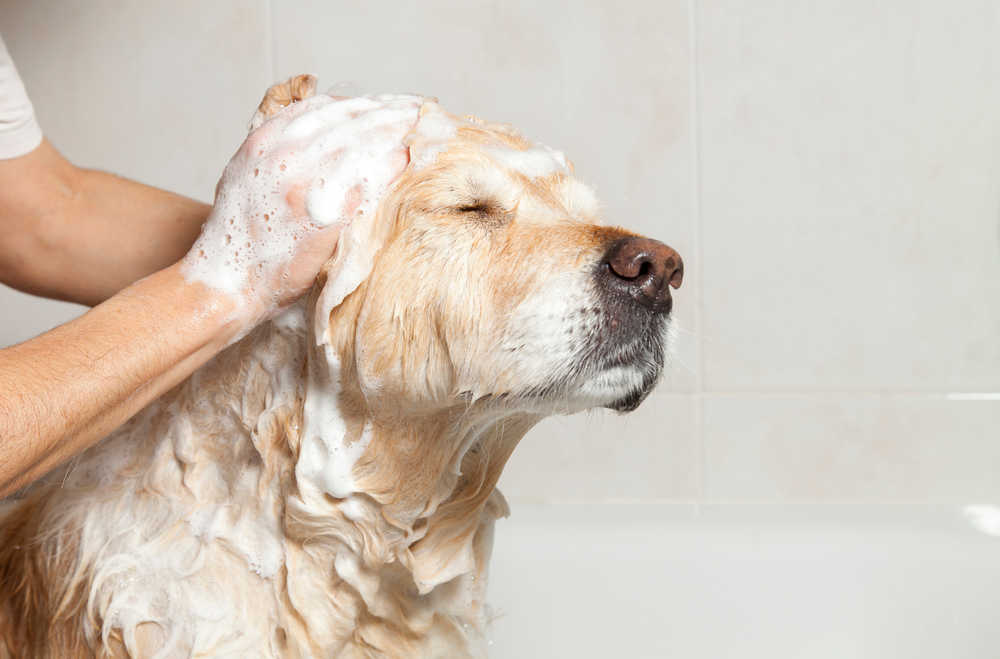
If your dog is sneezing a lot and has a confirmed diagnosis of environmental allergies from their veterinarian, you will likely have received medications to help. If your dog undergoes intradermal skin allergy testing, you may find there are things that your dog is allergic to that can be avoided. Unfortunately, many allergens are carried in the air and are impossible to avoid.
1. Keeping your dog inside. It may help to keep your dog inside on wet or windy days.
2. Modifying your backyard. If they are allergic to certain trees or grasses, eliminating them from your yard may also be helpful. However, eliminating all of these plants from your dog’s environment is often impossible if they are in neighboring yards or parks.
3. Cleaning your dog. Wiping your dog’s feet and fur with a damp washcloth or a baby wipe can also help to cleanse the allergens from the coat. Frequent bathing, typically every other week, with soothing shampoos can also help. Some over-the-counter products, such as Dechra’s Eicosa Snip Caps and Allerderm’s Spot On, can play a role in managing dog allergies. I also recommend Dechra’s Derm Allay shampoo.
If over-the-counter products and lifestyle changes are not sufficient to control the signs of your dog’s allergies, your veterinarian can guide you regarding further testing, treatment, and medications.
How the vet can help
The most important thing is to get an accurate diagnosis. Your veterinarian will ask you for a thorough history and will also perform a comprehensive examination. Skin scrapings, cultures, and other diagnostics may be necessary in some cases.
Remember that the goal is to manage the signs, as a “cure” of allergies is not possible. Fortunately, we have many very effective treatments for environmental allergies in dogs. These medications should be used as part of a multi-faceted approach, along with the things discussed above.
Oclacitinib (Apoquel®) is a Janus Kinase inhibitor (JAK1) that works to inhibit inflammatory molecules in the dog’s body that result in the itching and inflammation seen in environmental allergies. The medication needs to be given twice daily for the first two weeks, and then once daily as needed during the season(s) that the dog is itching. The drug is dosed on weight, but typically costs between $2.50 and $3.50 per tablet. Oclacitinib should not be given to dogs younger than one year, those with severe infections, or those that have been diagnosed with cancer.
Cytopoint® is an injectable treatment that is also very effective in the management of environmental allergies. This medication is a monoclonal antibody that works to target and neutralize canine interleukin 31 (cIL-31) which is a cytokine that leads to itching in dogs with these allergies. Cytopoint® is labeled for once monthly injection, but may last as long as eight weeks in some dogs. It should not be used in dogs that have a documented hypersensitivity to the drug. The cost of the injection is typically based on the weight of the patient and may range from $50-$250 each.
How to prepare for your veterinarian visit
If you are taking your dog to see their veterinarian, please be prepared to provide an accurate and thorough history of when your dog is affected by sneezing, itching, and licking. You should determine if anything in your dog’s environment correlates with their clinical signs, for example, repeatedly sneezing every time they play out in the grass or go to a particular park.
Other causes of sneezing in dogs (besides allergies)
Unfortunately, there are many things that may cause a dog to sneeze other than environmental allergies:
1. Foreign material in the nasal passage. For example, a blade of grass, is a fairly common cause of repetitive sneezing in dogs. These can be very deep within the nasal passages and may require general anesthesia and endoscopy to remove.
2. Upper respiratory infections. Infections are another common cause and may be accompanied by fever, nasal and ocular discharge, and coughing. These infections are bacterial, viral, or fungal, and will require proper diagnosis and treatment.
3. Nasal mites. Nasal mites are another possible cause of sneezing in dogs. These tiny parasites live in the dog’s nasal cavity and sinuses. Dogs with nasal mites tend to sneeze repeatedly and have nasal discharge.
Unfortunately, cancer can affect a dog’s nasal passages and sinuses and may result in sneezing. If your sneezing dog also has a bloody nose, especially if the blood exits just one nostril, you should have them evaluated by their veterinarian as soon as possible.
Learn more about dogs sneezing a lot, including top reasons (besides allergies) and how to help your dog.
A Note About Reverse Sneezing
Though this is not actually a sneeze, dogs often suffer from a phenomenon called reverse sneezing. In reality, this is actually the opposite of sneezing, as the dog is pulling air rapidly into their nose, not out. When a dog has a reverse sneezing episode, it can be very alarming for owners and may seem like the dog cannot breathe. However, it is a transient episode and is typically not a cause for concern. The affected dog should be calmed and soothed until the attack has passed.
Related posts:
Disclaimer: This website's content is not a substitute for veterinary care. Always consult with your veterinarian for healthcare decisions. Read More.




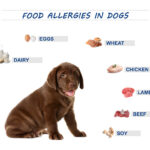
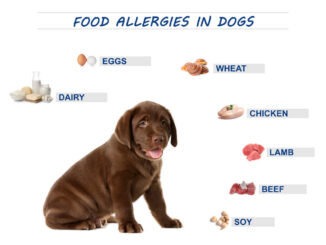
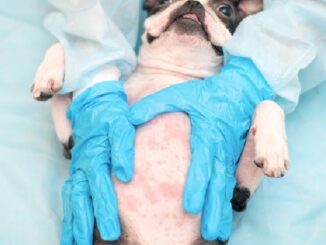

Be the first to comment